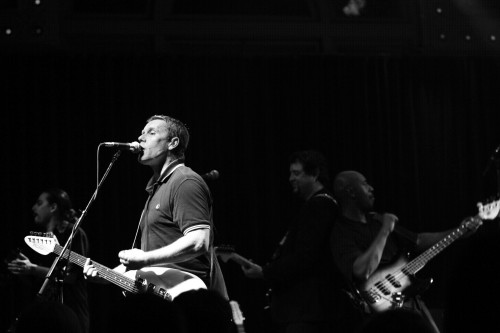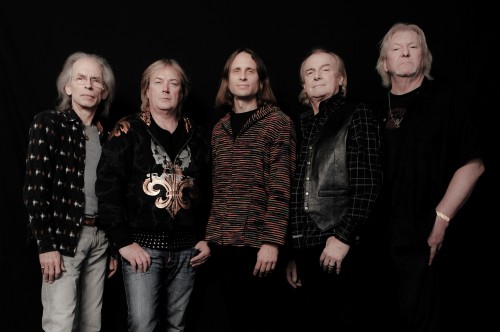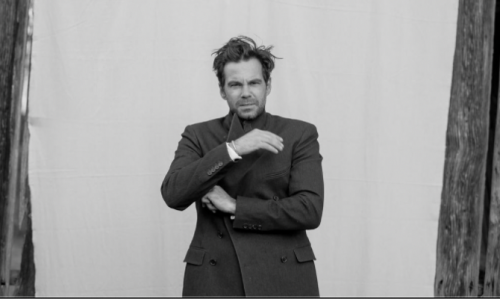By Michael Lello
At the forefront of Britain’s two-tone ska movement alongside bands like The Specials and Madness, The Beat – or The English Beat, as they are known in the U.S. due to a San Francisco band sharing the name – have had an indelible mark on the various waves of ska, punk, rock and pop music for decades.
The group churned out socially conscious songs like the anti-Margaret Thatcher anthem “Stand Down Margaret” and infectious hits like “Save It For Later,” and The Beat, now based in frontman Dave Wakeling’s adopted home state of California, is still quite active. The group released a career-spanning box set in 2012 (four stars from Rolling Stone), has just released the charity album “Specialized II” and tours regularly, with shows set for the Sellersville Theater on Saturday, Dec. 14, and World Café Live on Dec. 19.
We caught up with Wakeling – after he regained cell phone service during a snowstorm during a day off in the Poconos – to talk about “Specialized II,” which benefits the Teenage Cancer Trust (the first edition featured Specials songs, while “II” features artists’ renditions of Beat tunes), the legacy of Nelson Mandela (Wakeling recorded “Free Nelson Mandela” in 1988 with Elvis Costello and others), working with Scooby Doo and the two-tone legacy.
H81R: How did you get involved with the “Specialized” project?
DW: I sort of watched the first one from a distance kind of wondering if I might get invited. It was sort of a very U.K.-based thing, and it came and went. Afterwards I got a couple of requests, “Hey, would you like to promote this thing?” Not long after that, I heard would you give permission for The Beat songs to be the next project for the benefit album for the Teenage Cancer Trust. So I was thrilled, and spent the past year and did quite a bit of work with them on it to sort of set up a long-term relationship.
We just today announced the U.K. dates for March. I’m going to have “Specialized” and the Teenage Cancer Trust have a table there in the lobby of the venue, you know. I’m not sure, but I’m working on this idea; like a lot of bands now, we record most of our shows, and it really doesn’t take much to record it multi-track and be able to mix it afterwards. It wouldn’t really cost you that much nowadays. So I thought ‘Specialized’ might offer some sort of annual membership, and you get free live show downloads from the various groups. We’d start the ball rolling. So you’d join ‘Specialized’ for a year or something and you’d get a download of the live concerts at the live concerts. It wouldn’t be that live concert, but it would be pretty similar.
 H81R: What is it like hearing others people do your songs?
H81R: What is it like hearing others people do your songs?
DW: Well, really terrifying at first, because as you’re writing a song, you would’ve thought that you’ve tried about every which way that you could to put those melodies and those words, that you’d explored every opportunity. So the first thing you notice is the myriad different ways of interpretating – did I just say interpretating? (laughs) – interpreting your words. Nick Welsh’s version of “Save It For Later,” he completely changes the melody, quite confidently, and it works perfectly. So that was an eye-opener. . . . There were a few places where the people thought the words were something else, and it was just as good as what I thought (laughs).
I don’t know if it’s a sign of the times or whatever, but there were quite a bit of musicians that had that sort of acoustic, new folk vibe to them, like the version of “Stand Down Margaret” has very much a campfire sound to it, and I liked that a lot. . . .
I know Pearl Jam do a great version of “Save It For Later” in the middle of “Better Man,” because the lasting joke over the years was how similar the songs sound. You might be able to get Pearl Jam to do a version of “Save It For Later,” and Peter Townsend’s done a version of it too, maybe we can get him to sit in too [for a future “Specialized” release]. Eddie Vedder and Pete Townsend doing a duet of “Save It For Later,” and that’s probably something that would get more people’s attention over here in America.
H81R: You released the 5-CD “The Complete Beat” box set last year. Did you have a hands-on role in putting the set together?
DW: I was, and I was lucky, because the record company [Shout Factory!] ended up, I suppose by accident, about three miles from my house in Los Angeles. That way I could pop down there and jump into artwork meetings and marketing meetings and try to be as helpful as I could. But they’re really professional. They’ve done so many box sets and that. They know what works, and luckily they had two people who had been big Beat fans involved in the project from the kickoff, so they knew the songs, they knew what songs Beat fans had been trying to get for years — B sides from other countries and that sort of thing, 12-inch mixes and the like, the Peel radio sessions. So they sent us a really extensively researched running order for us to listen to. In the main part, they were great and we didn’t really change it. . . . It was all very efficient and quick, and it took the band months longer really to decide on the edits of the liner notes and which photographs. That took a lot longer than the music (laughs).
H81R: Was there a sense of pride in putting out a set that encapsulates the band’s legacy in one spot?
DW: It really was. Not just in terms of my feelings about it — I had never had a collection of all of the music from The Beat in one box (laughs). So it was really quite nice for me, I don’t have to dig around for those things. I really like listening to the John Peel sessions, I thought they were great — the versions of the songs before we had a record deal, before we even really knew would be making a record. There’s a sense of a mixture of a sort of brazen optimism and being completely out of our depth but trying to keep a straight face (laughs).
H81R: How would you describe The Beat’s live show now, as opposed to, say, the 1970s and ’80s?
DW: I think it’s got a slightly deeper and more soulful groove than it used to have, and that’s probably because of living in America for a couple of decades and playing with American musicians who play a lot of soul music as well.
H81R: Tell me about appearing on “Free Nelson Mandela” in 1988?
DW: I was honored to be asked. I’d been very moved in that period by some Highlife records from Nigeria. King Sunny Ade, Ebenezer Obey. I had been listening to a lot of African melodies and harmonies. When I got asked to do the song, there was like 3,000 people singing, and most of the obvious male harmonies had already got two or three candidates. So after listening to the song a few times, and my high voice is still pretty good, I could still sing pretty high, so I decided to do what normally be what the girls would do, falsetto, African – ‘Free Nelson Mandela’ [singing], way up there. And I sang with Elvis Costello and he said, ‘That’s fuckin’ great, Wakeling. Yeah, go on. That’s smashing. Great, lovely.’ And that was the end of it.
Some weeks later the song was on the radio, and my heavens, my voice was so loud. My God, I couldn’t believe it. I moved into the radio and got closer and closer and I’m like, ‘That’s Elvis Costello’s voice!’ (laughs) He had sung along with my harmonies and it was higher in the mix.
At the time, our opposition to Margaret Thatcher’s view of the world, one of which was absolute derision of Nelson Mandela, that he had passed the mark as a political terrorist. . . . I suppose we supported his cause all the more because of her opposition to him, you know? What’s been most interesting in the week since he’s passed is the debate about to what extent he was willing to use nonviolence as a method and at what point he decided that violence was the only way he was going to make a change. And at that point, that is when some people decided that he had become a terrorist. But by that definition, so was George Washington (laughs), so everybody’s in a real conundrum about this right now.
What I do think, from my own personal view, is that something happened to him during the 27 years in prison, that gave him the ability to connect deeply with people’s hearts afterwards, and he managed to find a way to bring out compromise in people when it should have been historically a bloodbath. To have a relative peaceful transition in South Africa is not something anyone expected.
H81R: Why do you think politics and social consciousness have been such a root part of punk and ska music?
DW: That’s the job of a troubadour, isn’t it, to sing songs about what he sees going on in the world around him as he travels around singing? It’s the traditional job of a troubadour. It only usually gets changed when there’s more money to be made dissolving that aspect of it, but that’s the traditional value of it I think.
But music’s got a bunch of different uses. It’s great for social commentary, and it’s also great for pure escapism when the social situation is so bad you just want to daydream (laughs). So I don’t decry anybody else’s attitude to music, but I think that what happens in our bigger world, our political or social world, affects how we operate our own personal lives and our personal relationships, so I kind of feel that they are all interconnected anyway. So I don’t really see a division, you know?
 H81R: Moving on to something less serious: the songs you recently recorded for a “Scooby Doo” episode.
H81R: Moving on to something less serious: the songs you recently recorded for a “Scooby Doo” episode.
DW: That’s far more serious (laughs). In television they are used to having someone come in with a laptop and having all of the music done. So they were not at all prepared for a band with instruments to show up and record two songs, but I insisted on it, because it was a battle of the bands. So what better than live instruments? That’s one of the emotional tugs of a battle of the bands. So we had to get two songs, one for the Hex Girls, the resident all-girl band on Scooby-Do, and the usurpers in the competition who were a zombie ska band – they weren’t really zombies, it was a ruse because they pretended to die in an air crash but they hadn’t (laughs). So they did a song called “You’re Dead Right Mate,” and the Hex Girls did a more rocking number called “We’re The Good Bad Girls.” It was a fantastic battle of the bands. . . . The battle is so intense, it takes Scooby Doo in the end to slide onto the stage like a soccer player that’s just scored and do this huge shredding solo for the Hex Girls that blows the ska zombie band away, and their ska zombie masks all drop off and they’re all caught and led away in handcuffs. And the good guys win, as is meant to happen on “Scooby Doo.” Even though it wasn’t the ska band, sadly.
It was great, I really enjoyed it. I had a Scooby Doo blanket in my little booth in the studio, trying to get the vibe with it, and we spoke with Scooby Doo accents as much as we could during the session.
H81R: In the early days of two-tone, when The Beat, The Specials and Madness were all coming up, was there a sense of camaraderie, or was it competition?
DW: It was a great sense of camaraderie, borne of the post-punk period when bands like The Undertones and the Buzzcocks had also been very friendly with their crowd. You got the feeling that you could meet them in the bar dressed in the same clothes as the audience before and after the show. So there was a sense, we all felt anti-competition between us. So The Specials [and The Beat] did a tour of Ireland where we alternated headlining and support band and all ended up doing a song together at the end, and that used to happen a lot with the various two-tone bands.
I suppose because it was such a runaway success and everyone was taking it in terms of banging another one in the Top Ten, we didn’t have any time for any competition. We all probably thought we were the best two-tone band anyway. It was all very cooperative and friendly. I think that was genuine, because I am still very close friends with most of The Specials.
H81R: What are your plans for The Beat in 2014?
DW: Well, we have a tour of Australia and New Zealand in May, and England in March, another American tour of the West Coast in February and then some serious recording I think. Probably in May and June and July, will be some recording and hoping to have a record out by the fall of next year I think would be the rough plan.
H81R: The Beat started 35 years ago. There have been breaks and lineup shifts, but 35 years later, the band still exists. Does that surprise you? How much longer do you see it lasting?
DW: Well, when I was 12 years old standing in my cricket vest and my blond wig that I had cut into the shape of Brian Jones’ haircut in my mom’s bedroom in front of the full-length mirror, I used to dream about being in a group so much that I thought it would only remain a dream and I would never have a chance to do that. So I was always shocked that I got to be in a group at all, and with each decade, that surprise has only grown. Now, after 35 years, I’ve slowly come to accept that. And I’m the happiest I’ve ever been doing it. I’m singing better than ever. I’ve learned how to do it properly now and the band is the grooviest and the best it’s ever been, and we’re just having a ball on stage. Mainly I think that doing as many shows as we do keeps me young. It’s like I get a workout everyday whether I want one or not. So I guess barring any surprise strokes in my sleep that I don’t even know about, I expect I should be doing this for another 20 years I think.




Leave a Reply